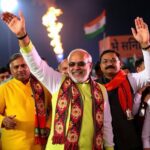PM Modi Critiques Congress After BJP’s 2025 Delhi Election Victory
Prime Minister Narendra Modi marked the BJP’s victory in the Delhi elections by criticizing the Congress party for undermining its allies and failing to win any seats in recent elections. He labeled Congress a “parasite party” that targets the voter base of other parties while highlighting the ineffectiveness of the INDIA opposition bloc. Modi’s comments illustrate the ongoing challenges in opposition collaboration against the entrenched dominance of the BJP in Indian politics.
Prime Minister Narendra Modi celebrated the Bharatiya Janata Party’s victory in the 2025 Delhi elections with a critical speech directed at the Congress party. He accused Congress of gradually undermining its allies, claiming they have been stealing agendas and voters and finishing them off one by one. In his address, he referred to Congress as a “parasite party,” criticizing its failure to secure any seats in six consecutive major elections in the region.
Modi articulated his argument by stating, “I have said before… the Congress is a parasite party. They take other parties with them whenever they are drowning.” He highlighted alleged tactics where Congress targets voters from other parties, such as the Samajwadi Party and the Bahujan Samaj Party in Uttar Pradesh and the ruling DMK in Tamil Nadu, suggesting their end is near for those who align with Congress.
Reflecting on the broader political landscape, the Prime Minister remarked on Congress’s current state, contrasting it with the party’s pre-independence history. He asserted, “Those who are holding the Congress’ hands are getting destroyed… because it is not the same Congress that was there before Independence… today it is doing ‘urban Naxal’ politics.” He linked his comments to the Aam Aadmi Party, which he characterized as previously promoting anarchy.
Modi’s address occurred amid growing doubts regarding the effectiveness of the INDIA opposition bloc, which was formed to contest against the BJP. Despite the coalition’s establishment, it has struggled, particularly highlighting Congress’s failure to negotiate seat-sharing agreements with allies like AAP for elections in Haryana and Delhi. These missed collaborations have diluted the potential impact of a united front against the BJP.
Although a powerful opposition coalition may still be insufficient to challenge the BJP’s electoral dominance, it could foster more competitive elections. The possibility remains that collaborative efforts could be revitalized before future contests, allowing for a united challenge against the BJP’s electoral machinery.
The political dynamics in Delhi have been heavily influenced by the ongoing rivalry between the BJP and Congress, compounded by the emergence of the Aam Aadmi Party. The Congress party’s declining influence has been stark, having not won any seats in three consecutive elections. As the BJP aims to consolidate its ruling status, Modi’s remarks underscore the perceived fragility of opposition alliances that have failed to capitalize on the BJP’s vulnerabilities. Understanding these developments is essential to grasp the challenges that opposition parties face in uniting against a well-organized BJP campaign.
In conclusion, Prime Minister Modi’s address after the BJP’s electoral victory in Delhi reflects a larger narrative surrounding the deterioration of the Congress party and its alliances. His critique of Congress highlights their electoral struggles and the ramifications for cooperative political strategies among opposition parties. The ongoing challenges in forming an effective coalition underline the complexities of contemporary Indian politics, particularly in the face of a robust ruling party.
Original Source: www.ndtv.com








Post Comment